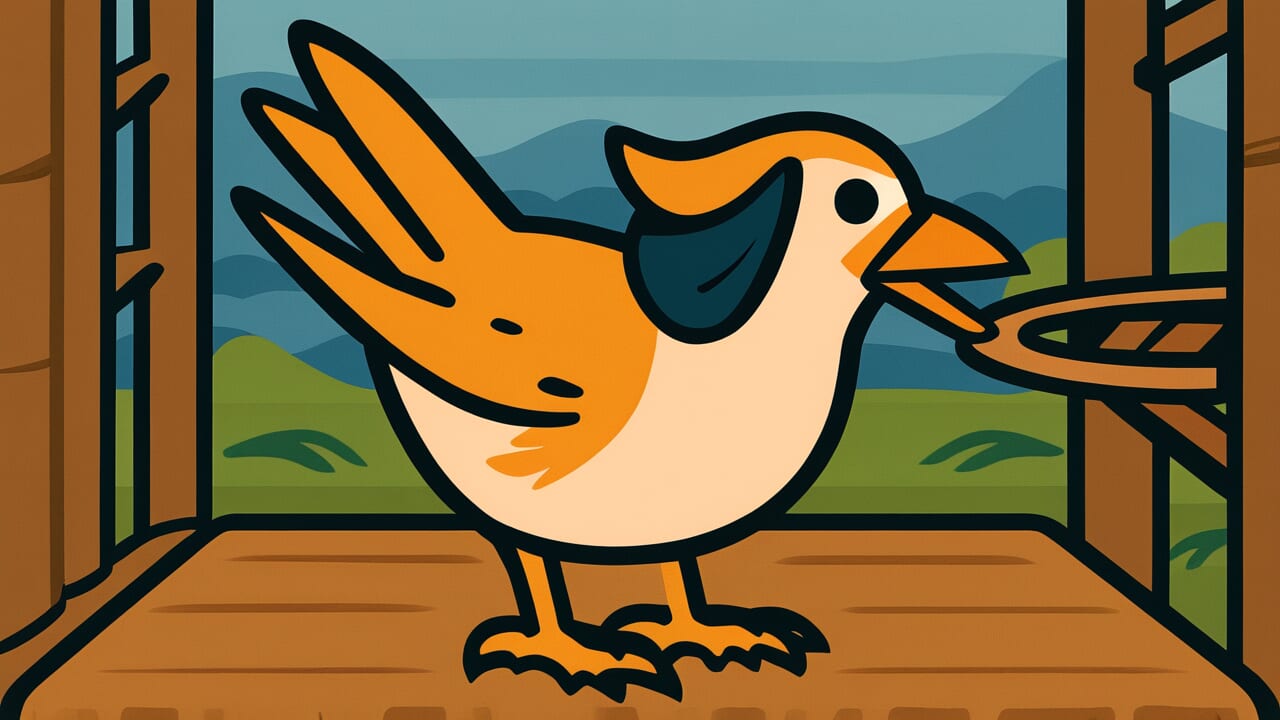How to Read “Like stabbing a pet bird”
Kaitori wo sasu gotoshi
Meaning of “Like stabbing a pet bird”
“Like stabbing a pet bird” is a metaphor for betraying someone close to you whom you have carefully nurtured.
It compares betrayal to the cruel act of stabbing a bird you have fed daily and loved deeply. This vivid image shows how painful it is to be betrayed by someone you trusted.
This proverb is used especially when someone betrays a person they owe gratitude to or someone they have built trust with over many years.
It criticizes situations like undermining a boss who trained you at work, exposing family secrets, or trampling on a best friend’s trust.
Even today, the nature of betrayal in human relationships remains unchanged. In fact, with information spreading instantly through social media, the impact of betraying someone close can be immeasurable.
This proverb asks us to consider the weight of trust and how sinful it is to break it.
Origin and Etymology
No clear written records remain about the origin of this proverb. However, we can make interesting observations from how the phrase is constructed.
Let’s focus on the word “pet bird.” Keeping birds has been deeply rooted in Japanese culture since ancient times.
During the Edo period especially, keeping small birds like bush warblers and white-eyes became popular even among common people. They carefully tended to these birds.
People fed them daily, enjoyed their songs, and sometimes let them perch on their hands. Through these daily interactions, deep bonds of trust formed between owners and their birds.
The act of “stabbing” a bird you have loved so much is heartbreaking just to imagine. This powerful contrast is considered the core of this proverb.
It expresses the cruelty of betraying someone you have cared for and built trust with through a concrete image everyone can understand.
The cleverness of this proverb lies in expressing the universal theme of betraying those close to you through “pet birds,” something familiar to Japanese daily life.
With just the right choice of words, the pain of betrayal comes through so vividly.
Usage Examples
- Publishing your master’s secret techniques without permission after years of training is like stabbing a pet bird
- When I heard he sold company secrets to a competitor, I felt outraged at such an act like stabbing a pet bird
Universal Wisdom
The proverb “Like stabbing a pet bird” speaks to us about the weight of trust, an invisible bond. Why do people betray those who believed in them?
Human relationships contain a strange paradox. The person you trust most deeply becomes defenseless before you.
Like a pet bird that doesn’t fear its owner’s hand, people remove their emotional armor in front of those they trust. And it is precisely this defenselessness that makes betrayal possible.
This proverb sees through that cruel truth.
Looking deeper, we can also see the psychology of the betrayer. When people betray those close to them, jealousy, anxiety, or self-preservation often lies beneath.
Because the relationship is close, the other person’s success can feel enviable. Being trusted creates temptation to exploit that position.
This proverb has been passed down through generations because it captures both the light and shadow that always exist in the human heart.
Trust is the most beautiful form of human relationship, yet also the most fragile. Our ancestors keenly understood this delicate balance.
When AI Hears This
Analyzing the act of stabbing a pet bird reveals an extremely interesting decision-making structure.
The owner has already invested in food costs and time spent caring for the bird. Psychology kicks in that doesn’t want to waste this investment.
Even if the bird tries to escape, they cannot let it go. As a result, they stab it. In other words, “costs already spent” distort their judgment.
According to behavioral economics experiments, humans feel the pain of losing 100 yen about twice as strongly as the joy of gaining 100 yen.
In the pet bird case, letting the bird escape is perceived as “the loss of all investment becoming zero.”
Stabbing the bird is “confirming complete loss,” but in the moment of decision when it tries to escape, people make the worst choice betting on a slim possibility.
Particularly noteworthy is the time scale on which this judgment occurs. In the few seconds when the bird tries to escape, the human brain instantly calculates past investment.
It moves reflexively to avoid the loss of being unable to recover that investment. This perfectly matches the psychology of someone losing at a casino who keeps betting thinking “I’ll win it back next time.”
People in the Edo period, knowing nothing of neuroscience or behavioral economics, expressed a fundamental flaw in the human decision-making system through a single bird.
Lessons for Today
What this proverb teaches you today is the preciousness of building trust and the heavy responsibility of protecting it.
In our era, human relationships begin surprisingly easily and also end easily. We connect on social media, exchange messages, and sometimes have deep conversations.
But real trust is not something so superficial. Like the relationship between a pet bird and its owner, it grows through daily accumulation.
If someone trusts you, it means they have opened their heart to you. Feel the weight of that.
Imagine how much pain you cause someone by casually leaking secrets or cutting off the relationship when it becomes inconvenient.
At the same time, this proverb teaches wisdom for protecting yourself. It doesn’t mean you should doubt everyone.
It simply means that trust is something you cultivate over time. Don’t rush to open your heart too quickly.
Deepen relationships gradually while observing the other person’s actions. Such caution is also necessary wisdom for living in the modern world.



Comments